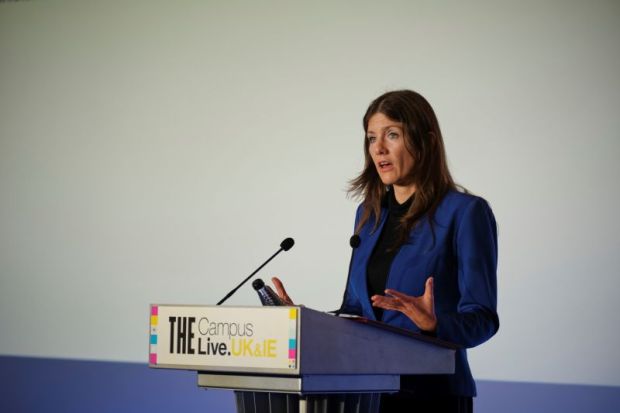Universities should “reflect carefully” about whether the Race Equality Charter and other diversity schemes are in conflict with their duties to uphold free speech, England’s higher education minister has said.
In a letter to universities on 27 June, Michelle Donelan highlighted concerns raised by MPs and the media that Advance HE’s racial equality initiative may “potentially be in tension with creating an environment that promotes and protects free speech”.
While stressing that universities are “autonomous institutions, and the decision over whether or not to join external assurance and benchmarking diversity schemes is up to each provider”, she nonetheless highlights a government policy document, published in 2020, which states that “in general, universities should feel confident in their ability to address such matters themselves and not feel pressured to take part in such initiatives to demonstrate their support for the cause the scheme addresses”.
Referring to the Race Equality Charter (REC), run by Advance HE, and “a number of other similar schemes”, the letter “invites careful consideration in respect of all of these.”
The letter by Ms Donelan follows reports in the The Sunday Telegraph that 25 Tory MPs who make up the Common Sense Group of Conservative MPs had written to education secretary Nadhim Zahawi urging him to ban universities from signing up the REC.
Of 23 universities to have been awarded the REC, 20 have explicitly said they are “decolonising” courses, while the remainder have pledged to “liberate”, “diversify” or introduce “compulsory race equality” to their syllabuses, the paper said.
Advance HE’s Athena Swan awards have also faced criticism for asking institutions to collect data based on gender identity, not biological sex, which critics claimed raised “uncomfortable questions about the tendency of the higher education sector to outsource its thinking about equalities to external bodies”.
Several UK universities, including UCL, have also left the Stonewall diversity champions programme amid fears that its requirements may inhibit academic freedom.
In her letter, Ms Donelan, who is spearheading new campus free speech legislation, added that the government had recently made available £750 million to support teaching and science facilities.
“Bearing in mind the substantial sums invested by the taxpayer in higher education, I would ask you to consider whether membership of these schemes, the initiatives that flow from them, and the creation of new, highly paid management roles in these areas truly represent good value for money for taxpayers or students,” said Ms Donelan.
In a statement, Advance HE said that “freedom of speech and academic freedom are core principles of higher education” and “must be protected”.
“Autonomous institutions must be able to make their own decisions about tackling racism and fostering inclusivity and this includes whether they wish to engage with the Race Equality Charter,” it added, stating that the REC is “about supporting inclusion and belonging and the success of black, Asian and minority ethnic staff and students, enhancing their voice and input, and therefore the freedom of speech of an institution overall, so they are complementary aims”.
In a statement on this issue published last month, and retweeted by Advance HE’s chief executive Alison Johns on 27 June, Advance HE added that “activism plays no part in our work and that “we have no particular ideological stance or agenda that we are seeking to promote”.
“We do not seek to compel our members to adopt particular theories, methods or stances – indeed, we have no power to do so even if we wanted to,” it said.
Register to continue
Why register?
- Registration is free and only takes a moment
- Once registered, you can read 3 articles a month
- Sign up for our newsletter
Subscribe
Or subscribe for unlimited access to:
- Unlimited access to news, views, insights & reviews
- Digital editions
- Digital access to THE’s university and college rankings analysis
Already registered or a current subscriber? Login








